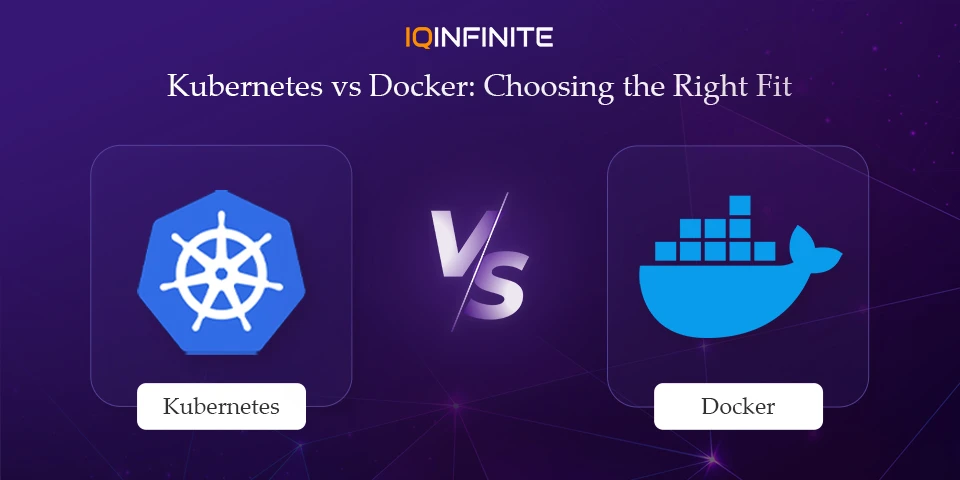Kubernetes vs Docker: Which One Fits Your Business Needs?

In today’s fast-paced digital world, containerization has become a cornerstone for building, deploying and scaling applications efficiently. Among the most widely adopted technologies in this space are Docker and Kubernetes. Although they are often used together each serves a distinct purpose. Understanding their differences, strengths and ideal use cases is essential for selecting the solution that best aligns with your business objectives.
What is Docker?
Docker is a leading platform for developing, shipping and running applications in containers. Containers encapsulate an application along with all its dependencies, ensuring that it runs consistently across different environments.
Key Features:
1. Lightweight: Containers share the host OS kernel, making them faster and more resource-efficient than traditional virtual machines.
2. Portability: Run containers seamlessly on any machine with Docker installed.
3. Isolation: Each container operates independently, reducing conflicts between applications.
4. Ease of Deployment: Package applications with all dependencies into a single, ready-to-run container image.
2. Portability: Run containers seamlessly on any machine with Docker installed.
3. Isolation: Each container operates independently, reducing conflicts between applications.
4. Ease of Deployment: Package applications with all dependencies into a single, ready-to-run container image.
Ideal Use Cases:
- Small to medium-scale applications
- Rapid development and prototyping
- Consistent development environments
- Continuous Integration/Continuous Deployment (CI/CD) pipelines
What is Kubernetes?
Kubernetes is an open-source container orchestration platform designed to manage clusters of containers across multiple hosts. While Docker focuses on individual containers, Kubernetes handles large-scale deployments with automation, scalability and high availability.
Key Features:
1. Automatic Scaling: Dynamically scale applications up or down based on demand.
2. Self-Healing: Automatically replaces failed or unresponsive containers.
3. Load Balancing: Distributes network traffic efficiently to ensure stability.
4. Rolling Updates: Deploy updates seamlessly with zero downtime.
5. Multi-Cloud Support: Run applications across on-premises and cloud environments effortlessly.
2. Self-Healing: Automatically replaces failed or unresponsive containers.
3. Load Balancing: Distributes network traffic efficiently to ensure stability.
4. Rolling Updates: Deploy updates seamlessly with zero downtime.
5. Multi-Cloud Support: Run applications across on-premises and cloud environments effortlessly.
Ideal Use Cases:
- Large-scale applications with multiple microservices
- Applications requiring high availability and reliability
- Multi-cloud and hybrid cloud deployments
- Complex orchestration and automation requirements
Docker vs Kubernetes: Key Differences
While Docker and Kubernetes are both essential tools in the container ecosystem, they serve different purposes. Docker is primarily a containerization platform designed to run individual containers. It is ideal for development and small-scale deployments, offering a lightweight and easy-to-start solution. However, scaling with Docker is mostly manual and high availability features are limited.
On the other hand, Kubernetes is a powerful container orchestration platform that manages clusters of containers across multiple hosts. It excels in production and enterprise-grade deployments, providing automatic scaling, built-in high availability and advanced orchestration capabilities. Kubernetes has a steeper learning curve compared to Docker but is indispensable for complex, large-scale applications that require reliability, resilience and seamless multi-cloud support.
On the other hand, Kubernetes is a powerful container orchestration platform that manages clusters of containers across multiple hosts. It excels in production and enterprise-grade deployments, providing automatic scaling, built-in high availability and advanced orchestration capabilities. Kubernetes has a steeper learning curve compared to Docker but is indispensable for complex, large-scale applications that require reliability, resilience and seamless multi-cloud support.
Do You Need Docker, Kubernetes or Both?
1. Small or Simple Applications:
Docker alone may be sufficient. It allows fast deployment, easy testing and ensures consistency across environments.
2. Growing or Enterprise Applications:
Kubernetes is ideal when you need automated scaling, fault tolerance and orchestration for multiple containers and services.
3. Combined Approach:
Many businesses use Docker for containerization and Kubernetes for orchestration. This provides the best of both worlds: lightweight containers and automated management at scale.
Docker alone may be sufficient. It allows fast deployment, easy testing and ensures consistency across environments.
2. Growing or Enterprise Applications:
Kubernetes is ideal when you need automated scaling, fault tolerance and orchestration for multiple containers and services.
3. Combined Approach:
Many businesses use Docker for containerization and Kubernetes for orchestration. This provides the best of both worlds: lightweight containers and automated management at scale.
Practical Tips for Decision Making
- Evaluate Your Scale: If your app handles minimal traffic, Docker may suffice. For thousands of concurrent users, Kubernetes is preferable.
- Consider Team Expertise: Kubernetes requires DevOps knowledge. Docker is simpler for small teams.
- Check Infrastructure Needs: Kubernetes shines in multi-cloud or hybrid cloud environments. Docker works well for single-host setups.
- Budget and Resources: Kubernetes adds complexity, which may increase management costs.
Conclusion
Choosing between Docker and Kubernetes depends on your application size, scalability requirements, team expertise and business goals. Docker is perfect for development, testing and small-scale deployment while Kubernetes is the go-to solution for managing large-scale, resilient and highly available applications. Often, the most efficient approach is to use Docker containers orchestrated by Kubernetes for a robust, scalable architecture.
